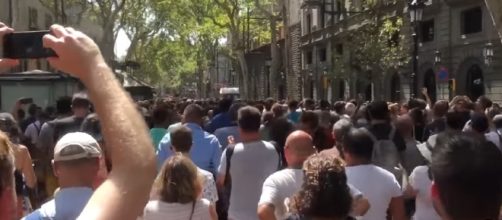The Spanish monarch, King Felipe Vi, joined about 500,000 street protesters in Barcelona over the weekend to protest the terrorist attacks that killed 15 people and wounded 120 others. The Spanish king was joined for the demonstrations by Prime Minister Mariano Rajoy and several other high-ranking government officials to condemn a terrorist attack that shook the roots of the country, CBS News reported.
The street protesters chant 'I’m not afraid'
Although this is the first time a Spanish monarch would show solidarity with his people by engaging in street demonstrations, the extremity of the attacks had not been witnessed in the country in more than ten years.
The street protesters carried banners and placards on which were written “No Tinc Por” in the local Catalan language, meaning “I’m not afraid.”
The public march was led by emergency workers and local citizens as well as uniformed policemen while King Felipe VI and other government officials brought up the rear. Some dissidents used the occasion of the king’s participation in the 500,000-man march to raise placards condemning his actions in sending Spanish soldiers to Saudi Arabia.
The “I’m not afraid” protest chant is fast gaining ground among local citizens through the region of Catalan, with regional officials in the area already embracing it as a political slogan to back the people.
ISIS takes glory for the inglorious carnage
The Islamic State of Iraq and Syria (ISIS) claimed responsibility for the August 17 attacks which was carried out in Las Ramblas Boulevard, one of Spain’s top cities. Another attacked was unleashed in Cambrils, a Spanish coastal town. Explosives loaded in vehicles were detonated in Las Ramblas, but a house was blown up in Alcanar.
Further investigations revealed the terrorists had been storing massive explosives and gas tanks in the Alcanar building before they mistakenly blew it up, leaving eight of them dead. Police authorities arrested two extremists later, and a court freed two others and stipulated that they must be placed under further monitoring.
Many of those wounded in the attacks are currently undergoing treatment in hospitals, while six remain in critical conditions. Many of those wounded are from China, France, Peru, Germany, the U.S. and several other countries.
The Muslim community in Ripoll, where many of the extremists came from, has condemned the attacks in no uncertain terms and voiced their supports to the government.


